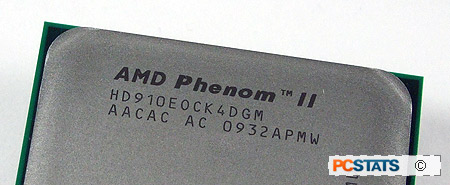 |
| Overclocking Results: |
|
|
Overclocking an energy efficient processor is somewhat
akin to taking a Toyota Prius and supercharging the engine - a sightly redundant
exercise. Nevertheless, overclocking continues to be the mainstream feature in
every motherboard's sales pitch, so it's worthwhile to know what kind of
headroom a 65W TDP processor like the 2.6GHz quad-core AMD Phenom II X4 910e
actually has.
First thing's first, the dual channel Corsair
XMS3-1600C9 memory used in the PCSTATS test system was configured to run in
DDR3-800 MHz mode (from DDR3-1066) so it wouldn't hold the CPU back. The Phenom
II X4 910e is not a Black Edition socket AM3 chip
with unlocked multipliers, so that means we'll be overclocking by bus speeds
alone.
 With the chip
installed into the trusty AMD 790FX-based Gigabyte GA-MA790FXT-UD5P motherboard, PCSTATS loaded
up the BIOS and set about increasing the processor bus speed from 200MHz on
up...
With the chip
installed into the trusty AMD 790FX-based Gigabyte GA-MA790FXT-UD5P motherboard, PCSTATS loaded
up the BIOS and set about increasing the processor bus speed from 200MHz on
up...
The Phenom II X4 910e CPU POST'd fine at 225MHz, 250MHz
and 260MHz; an increase in CPU speed from 2.6GHz to 3.38GHz. Attempts were made
for 260MHz bus and 280MHz bus, but while the PC would POST and begin to load
Windows Vista it crashed or would BSOD half way through the boot process. No
luck there. At the end of the day PCSTATS settled for a maximum overclock result
of 260MHz bus, yielding a processor overclock of 3.38GHz - or put another way an
increase of 780MHz over the stock 2.6GHz speed.
Prelude to
Benchmarks
For this
review PCSTATS is running the benchmark suite in both Microsoft Windows Vista
and Microsoft Windows 7 operating systems. For the most part, benchmark results
are not significantly different between the two operating systems, although
certain tests do see advantages under Windows 7.
Over the following page we'll be running AMD's 2.6 GHz quad-core Phenom II X4 910e
processor though PCSTATS standard set of gaming, productivity, and
multi-threaded processor benchmarks. There are a wide variety of gaming and
synthetic benchmarks here to illustrate what kind of performance boost users can
expect from the latest quad-core socket AM3 AMD processor. Please take a moment
to look over PCSTATS test system configurations before moving on to the
individual benchmark results on the next several pages.
 |
| PCSTATS Test System Configurations |
|
test system |
reference system #1 |
reference system #2 |
reference system #3 |
| processor: |
amd Phenom II X4 965 Black Edition
AMD Phenom II X4 955 Black
Edition
AMD
Phenom II X4 910e Black Edition
AMD
Phenom II X3 720 Black Edition
AMD Phenom
II X2 555 Black Edition
AMD Phenom II X2 550 Black Edition
AMD Athlon
II X4 635
AMD Athlon II X4 620
AMD Athlon II X3 435
AMD Athlon II X2 250
AMD Athlon II X2 240e |
Intel Core i5 750 |
Intel Core i7 920 |
Intel Core 2 Duo E8500
Intel Core 2 Duo E8400 |
| CPU
Process Technology: |
45nm |
45nm |
45nm |
45nm |
| Socket: |
Socket AM3 |
Socket
LGA1156 |
Socket
LGA1366 |
Socket
LGA775 |
| Clock
Speed: |
17x 200MHz = 3.4 GHz (965 BE)
16x 200MHz = 3.2 GHz(955 BE)
13x 200MHz = 2.6
GHz(910e)
14 x 200 MHz = 2.8 GHz
(720 BE)
16.0x 200MHz = 3.2 GHz (555BE)
15.5x 200MHz = 3.1 GHz (550BE)
14.5x 200MHz = 2.9 GHz (AIIX4 635)
13x 200MHz = 2.6 GHz (AIIX4 620)
14.5x 200MHz = 2.9 GHz (AIIX3 435)
15x 200MHz = 3.0 GHz (AIIX2 250)
14x 200 MHz = 2.8 GHz (AIIX2 240e)
|
20x 133MHz =
2.66 GHz |
20 x 133 MHz =
2.67 GHz |
9.5 x 333 MHz =
3.16GHz (E8500)
9 x 333 MHz = 3.0 GHz
(E8500) |
| Motherboard: |
Gigabyte GA-MA790FXT-UD5P (AMD
790FX) |
Gigabyte
GA-P55-UD6 (Intel P55)
|
MSI X58 Platinum
(X58 Express) |
MSI X48
Platinum (X48 Express) |
| Videocard: |
ASUS ENGTS250 DK
(Geforce GTS250) |
ASUS ENGTS250 DK
(Geforce GTS250) |
ASUS ENGTS250 DK
(Geforce GTS 250) |
MSI NX8800GTS-T2D320E
(Geforce 8800GTS) |
| Memory: |
2x2GB Corsair XMS3-1600C9 DDR3
2x1GB Patriot PDC32G1600LLK DDR3 |
2x2GB Corsair XMS3-1600C8
DDR3 |
3x2GB Corsair TR3X6G1600C8D
DDR3 |
2x1GB Patriot PDC32G1600LLK DDR3 |
| Hard
Drive: |
74GB Western Digital Raptor WD740 |
| Optical Drive: |
ASUS BC-1205PT-BD |
| Power
Supply: |
PC Power & Cooling TurboCool 750W |
| Heatsink: |
Athlon64 K8 Reference Heatsink |
Intel Reference
1156 Heatsink |
Intel Reference
1366 Heatsink |
Intel Reference 775 Heatsink |
| Software Setup: |
Microsoft
Windows Vista Ultimate
Microsoft Windows 7
Ultimate
AMD Catalyst 9.12
nVIDIA Forceware 195.62 |
Microsoft
Windows Vista Ultimate
Microsoft Windows 7
Ultimate
Intel 9.1.1.1019
nVIDIA Forceware 190.62 |
Microsoft
Windows Vista Ultimate
Intel INF
9.1.0.1012
nVIDIA Forceware
182.08 |
Microsoft
Windows Vista Ultimate
Intel INF
9.0.0.1008
nVIDIA Forceware
169.25 |
| Benchmarks: |
System Benchmarks:
SYSmark 2007
PCMark Vantage
SiSoft Sandra 2009 |
Calculation B/M:
Super Pi 1.5
wPrime 2.0
ScienceMark 2.3
Bibble 5 |
Rendering
B/M:
Cinebench R10
POV-Ray
3.7 |
Gaming
B/M:
3DMark06
3DMark Vantage
Cyrsis
FEAR
| | |
